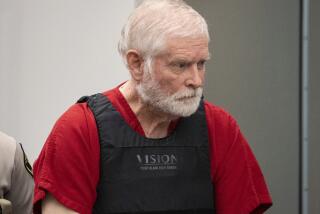Jury Gets Case in Kyle’s Second Murder Trial
- Share via
Deliberations began Friday in the second murder trial of Ricky Kyle, the Texas son of a wealthy television executive shot to death three years ago as he searched for a prowler in his Bel-Air mansion.
Kyle insists that he fired in self-defense when his millionaire father began shooting as they searched the darkened estate for a burglar, but the prosecution charges that a father-son rift involving drugs and greed led to premeditated murder.
The deliberations follow 4 1/2 months of testimony in the retrial of Henry Harrison (Ricky) Kyle Jr., who is charged with first-degree murder in the July, 1983, shooting death of Henry Harrison Kyle Sr. The eight-woman, four-man panel was given final instructions by Superior Court Judge Robert Altman.
“It was a long trial, and there are a lot of exhibits, probably a couple hundred of them,” defense attorney John Vandevelde said. “I would expect deliberations could be lengthy, extending well into January.”
First Jury Deadlocked
The 23-year-old Kyle’s first trial ended in a mistrial in April, 1985, when a Superior Court jury deadlocked 10 to 2 for conviction.
“As in the first trial, his defense is that he and his father were both up looking for the prowler and that his father shot in his direction unexpectedly and Ricky Kyle reacted to that in self-defense and Ricky shot at his father,” Vandevelde said.
Vandevelde told jurors in his closing argument Monday that the prosecution never proved Kyle killed his father in a premeditated plot.
“The prosecution can prove he lies and uses drugs, but they can’t prove exactly how Ricky Kyle shot Henry Kyle. The prosecution has been avoiding the issue,” Vandevelde said.
But Deputy Dist. Atty. Stanley Weisberg said the younger Kyle, fearing that he would be cut from his father’s will and consumed with hatred for the man, lured his father out of bed on the night of July 22, 1983, claiming that he heard a prowler inside his father’s newly acquired Bel-Air mansion.
Weisberg is not seeking the death penalty because special circumstances were not alleged.
Investigators said the son used the burglary ruse as an excuse to shoot Kyle, who managed to return fire. The younger Kyle was wounded in the elbow.
The elder Kyle had moved to Los Angeles in the spring of 1983 after buying into Four Star Productions, a TV production company. He headed a $100-million empire that included apartments, restaurants, dairy farms, a bank and a TV studio.
Weisberg said Kyle felt nothing but hatred for his 60-year-old father and greed for the production company executive’s fortune.
“Before Henry Kyle’s death, Ricky Kyle talked about killing his father because he hated him and he was desperate for his money,” Weinberg said in his closing statement.
“He put a bullet through his father’s heart, then told people afterward.”
The prosecutor said Kyle was a liar who stole from his family to support a cocaine habit.
Kyle contended during his trial that he returned fire in self-defense when his father suddenly began shooting at him as they searched for a prowler.
Vandevelde compared the prosecution’s case to a suspense builder on the popular TV show “Dallas,” where the audience wondered for a whole summer who shot the character J. R. Ewing.
“They wanted people to wonder, and they wanted people to guess and speculate about what happened,” he said. “What they wanted to do was have people tune in. The prosecution had all the resources--tapes, mannequins, diagrams--but did the prosecution tell you what happened in that room? The answer is no.”
Vandevelde said that if Kyle had planned to kill his father, he passed up two perfect opportunities to do it.
He reminded jurors that Kyle stood over his father with a loaded shotgun when he went to tell him he thought a prowler was in the home. Kyle also could have killed his father as he followed him through the house while searching for the prowler, he added.
Weisberg said Kyle inherited only $1.5 million of his father’s estimated $20-million fortune, and that he spent most of it to pay for his lawyers.
More to Read
Sign up for Essential California
The most important California stories and recommendations in your inbox every morning.
You may occasionally receive promotional content from the Los Angeles Times.













